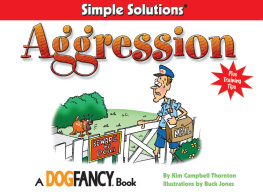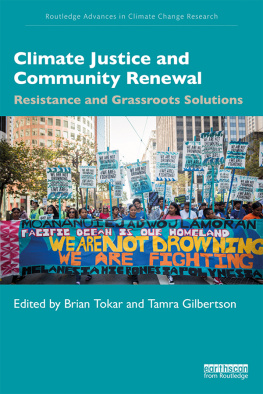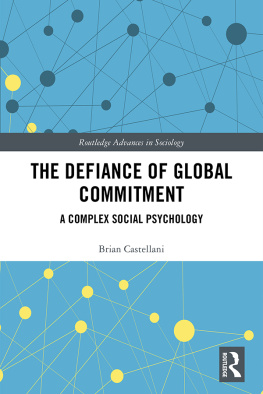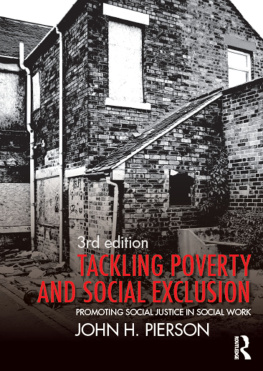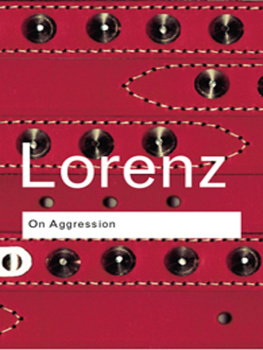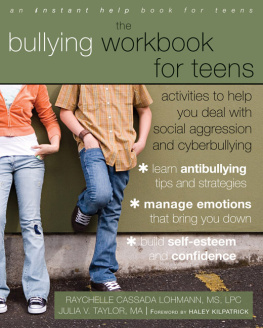Working with Aggression and Resistance in Social Work
Working with Aggression and Resistance in Social Work
Edited by
BRIAN J TAYLOR
Series Editors: Jonathan Parker and Greta Bradley
First published in 2011 by Learning Matters Ltd
All rights reserved. No part of this publication may be reproduced, stored in a retrieval system, or transmitted in any form or by any means, electronic, mechanical, photocopying, recording, or otherwise, without prior permission in writing from Learning Matters.
2011 Gerry Heery (, Conclusion)
British Library Cataloguing in Publication Data
A CIP record for this book is available from the British Library
ISBN 978 0 85725 429 0
This book is also available in the following formats:
Adobe ebook ISBN: 978 0 85725 431 3
EPUB ebook ISBN: 978 0 85725 430 6
Kindle ISBN: 978 0 85725 432 0
The right of Gerry Heery (, Conclusion) to be identified as the Authors of this Work has been asserted by them in accordance with the Copyright, Designs and Patents Act 1988.
Cover and text design by Code 5 Design Associates Ltd
Project Management by Deer Park Productions
Typeset by Pantek Arts Ltd, Maidstone, Kent
Printed and bound in Great Britain by Bell & Bain Ltd, Glasgow
Learning Matters Ltd
20 Cathedral Yard
Exeter EX1 1HB
01392 215560
www.learningmatters.co.uk
Contents
Brian J Taylor
Aisling Monds-Watson
Aisling Monds-Watson
Brian J Taylor
Gerry Heery
Campbell Killick
James Marshall
Roger Manktelow
Trevor Lindsay
Mary McColgan and Geraldine Fleming
Brian J Taylor
Editor and Contributors
Professor Mary McColgan is Professor of Social Work at the University of Ulster and Head of the School of Sociology and Applied Social Studies. She is a qualified social worker and practice teacher with a background in family and child care, and in healthcare practice. She has been involved with social work education and training for over 25 years and her research interests include child protection, family support and womens emotional health and well-being.
Geraldine Fleming is Commissioning Lead for Mental Health at the Health and Social Care Board for Northern Ireland, having previously been Assistant Director for Physical Health and Disability Services in the Northern Health and Social Care Trust. She is a qualified social worker with 15 years experience working in adult social care. Her research interests include adult safeguarding, risk management and quality of services in adult care.
Gerry Heery is an independent social worker, trainer and consultant with over 25 years experience in child care and justice work. He has been involved in developing and delivering domestic, family and general violence-related programmes and is author of Preventing Violence in Relationships (2000), the Parents Anger Management Programme (2007) and the soon-to-be-published Choosing Non-Violence: A Programme for Young People to Address the Use of Violence. He lives with his wife Maire in Belfast and they have five children.
Dr Campbell Killick is Senior Social Worker (Research) with the South Eastern Health and Social Care Trust in Northern Ireland. His work focuses on enabling social workers to make use of best evidence in their practice and on developing research to inform social care services. He has had a lead role in training social work staff in adult protection work, and he has been involved in a number of studies relating to the protection of vulnerable adults from abuse.
Trevor Lindsay is Lecturer in Social Work at the University of Ulster with 17 years experience in higher education. He draws on 20 years probation practice specialising in groupwork and group care. He is the lead author of Groupwork Practice in Social Work and is editor and main contributor to Social Work Interventions, both in the Learning Matters Transforming Social Work Practice series.
Dr Roger Manktelow worked as a mental health social worker for some 15 years before moving to the University of Ulster at Magee where he has taught social work and mental health for the last 20 years. He has published widely in his research areas, which include statutory mental health social work, help-seeking in mental health, mental health inequalities, and the mental health needs of the victims of the Northern Ireland troubles.
James Marshall is Associate Lecturer at the University of Ulster and an independent social worker with 25 years experience in family and child care practice. He teaches undergraduate and postgraduate child care and has recently written a social work guide for the Health and Social Care Board on child care practice in Northern Ireland. His research area is child protection practice, in particular investigative interviewing of children for court.
Aisling Monds-Watson is Lecturer in Social Work at the University of Ulster, having previously practised in both community mental health, and in family and child care social work. Her research is in the area of adult mental health, with a particular focus on social work with mothers experiencing mental health difficulties.
Dr Brian J Taylor is Senior Lecturer in Social Work at the University of Ulster, having previously spent 12 years as a social work practitioner and manager and 15 years in employer-based training and development. He has faced aggression and violence as a social work practitioner and has known colleagues and students who have been assaulted by clients during his 30 years in the profession. He is accredited as a Personal Safety Advisor with the British Judo Association and has trained with the Care and Responsibility personal safety framework for health and social care staff.
Series Editors Preface
The Western world including the UK face numerous challenges over forthcoming years. These include dealing with the impact of an increasingly ageing population, with its attendant social care needs and working with the financial implications that such a changing demography brings. At the other end of the life-span the need for high quality child care, welfare and safeguarding services have been highlighted as society develops and responds to a changing complexion.
Migration has developed as a global phenomenon and we now live and work with the implications of international issues in our everyday and local lives. Often these issues influence how we construct our social services and determine what services we need to offer. It is likely that as a social worker you will work with a diverse range of people throughout your career, many of whom have experienced significant, even traumatic, events that require a professional and caring response. As well as working with individuals, however, you may be required to respond to the needs of a particular community disadvantaged by world events or excluded within local communities because of assumptions made about them. What is clear within these contexts is that you may be working with a range of people who would, to say the least, rather not be involved with social workers, or may be actively aggressive and violent. This book provides important knowledge and information to help you become aware of these issues, to protect yourself and respond appropriately when faced with potential violence.



